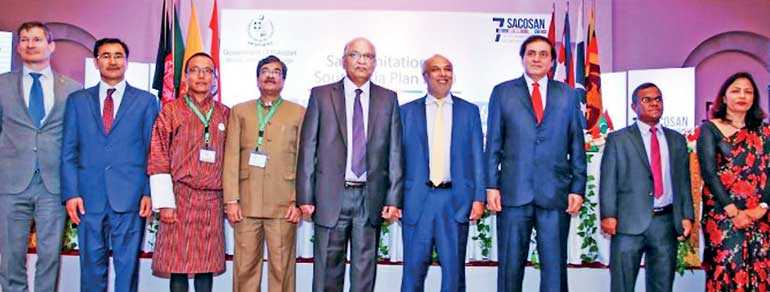Tuesday Feb 17, 2026
Tuesday Feb 17, 2026
Thursday, 26 April 2018 00:00 - - {{hitsCtrl.values.hits}}

At the conclusion of the 7th South Asian Conference on Sanitation, held in Islamabad, Pakistan, the member nations committed to improve sanitation in the region.
Following is the full text of the declaration adopted at the Conference:
We, the Heads of Delegations from Afghanistan, Bangladesh, Bhutan, India, Maldives, Nepal, Pakistan and Sri Lanka, participating in the 7th South Asian Conference on Sanitation, (SACOSAN-VII) in Islamabad, Pakistan in April 2018:
(1) Realising that safely managed drinking water and sanitation services are basic rights of every person; and poor access to safely managed sanitation services and hygiene is a leading cause of preventable diseases and stunting,
(2) Appreciating SACOSAN member states for integrating sustainable development goals (SDGs) into national development agendas,
(3) Recognising that significant progress has been made towards reducing open defecation in the region, and growing attention is being given towards building sustainable and safely managed sanitation systems and hygiene behaviours,
(4) Understanding that South Asia Is home to many of the world’s most rapidly urbanising areas, presenting challenges In service provision but also real economies of scale In serving densely Inhabited areas,
(S) Reaffirming all SACOSAN commitments made between 2003 and 2016, and reiterating our call for Joint actions and learning through SACOSAN being a nonpartisan forum, so that all South Asians may enjoy safe and adequate sanitation and hygiene,
SACOSAN VII unanimously resolves and commits to:
1. Establish baselines and WASH Targets for SDG-6.1 & 6.2, including the elimination of open defecation and progress towards universal basic and safely managed sanitation services and hygiene. All countries in the region should review and align their national and sub-national policies/strategies with safely managed sanitation services and hygiene as outlined in SDGs.
2. Streamline and align the data collection tools, processes and approaches of key national and sub-national surveys, so that they track progress on WASH related SDGs.
To ensure no one is left behind by; generating evidence to understand inequalities in access to WASH, especially around geographical areas, vulnerable groups and income levels; improved targeting of those least served; strengthening participation and accountability in collaboration with sector partners
4. Conduct structured human resource opacity assessment, followed by a roadmap for human resource development for public sector, civil society, service providers and other stakeholders engaged in WASH.
5. Introduce essential sectoral reforms, based on comprehensive legislative reviews with a specific focus on regulatory frameworks and institutional arrangements, including enhanced inter-ministerial coordination for quality sanitation and hygiene services.
6. Develop effective financial planning, and reporting on sanitation and hygiene related Investments to achieve SDG related targets by strengthening the tracking and monitoring processes.
7. Develop national and sub-national advocacy plans, strategies and campaigns that promote use and sustainability of sanitation services as social norms with the active engagement of all.
8. Prioritise WASH in institutional settings, especially accessible WASH in schools, health care facilities and public places including sensitisation and provision for menstrual hygiene management.
9. Collaborate to strengthen knowledge management and learning on sanitation and hygiene, at regional, national and sub-national levels, through training centres and networks.
10. Support climate change adaptation, and explore financing to promote climate resilient sanitation and hygiene technologies and behaviours in general, and in at-risk communities in particular.
We express our profound appreciation to the Government and People of Pakistan for their excellent hosting of this event and for their generosity and hospitality.